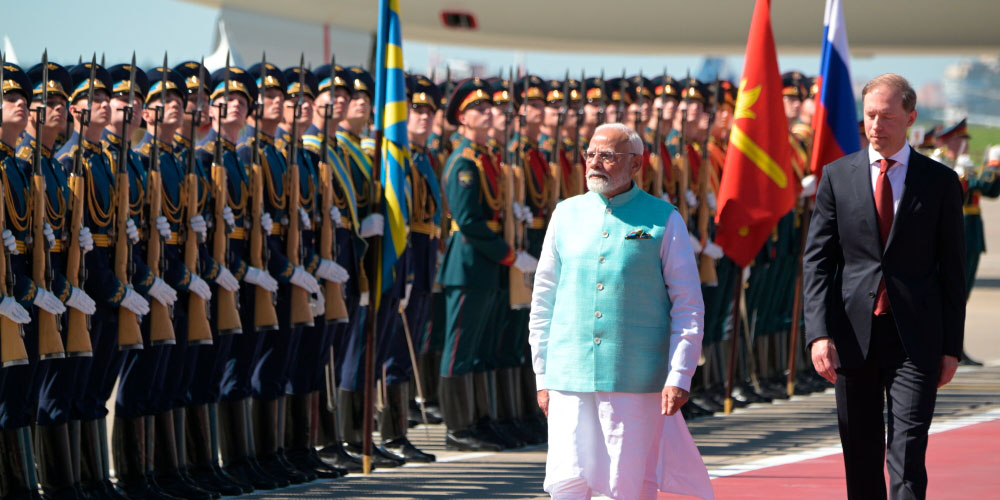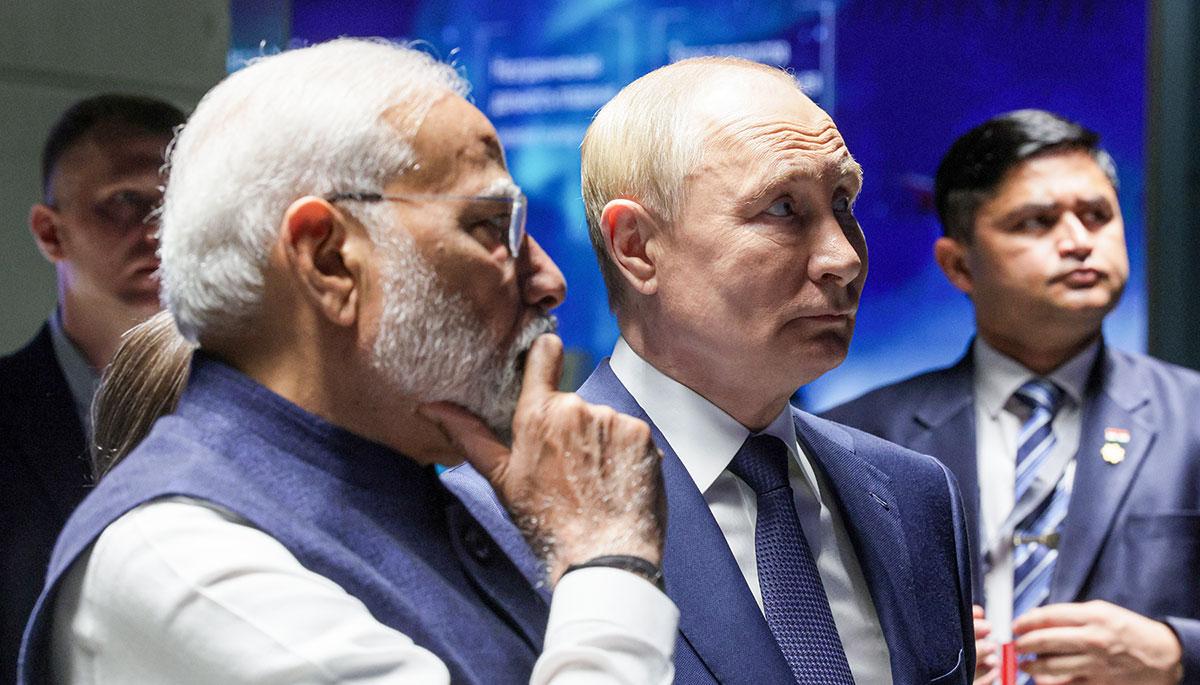On August 23, on the eve of Ukraine’s Independence Day, Prime Minister Narendra Modi travelled to Ukraine after concluding his visit in Poland. The half-day trip to Kyiv was the first ever taken by an Indian Prime Minister to Ukraine. During the visit, four agreements were concluded. Modi met President Volodymyr Zelensky and conducted a meeting that lasted for two and a half hours. Prior to the visit, the expected outcome was to further develop bilateral cooperation, explore avenues of increasing bilateral trade—which plummeted after the start of the conflict in Ukraine—and, more importantly, ascertain whether India has a peace-making role to play in the conflict. Most issues were addressed during Modi’s visit to Ukraine, but a fundamental question still remains: what does Modi’s trip mean for India’s foreign policy? Does such a visit indicate India’s desire to take a more proactive position in European affairs, or does it show how India’s policy of strategic autonomy has reached its limits following Modi’s warm reception in Moscow on June 8?
Europe’s growing relevance in India’s foreign policy strategy has mainly been geoeconomic, where India’s trade with Central and Eastern European countries has increased. Still, this interest does not percolate to the security realm; New Delhi has continued to emphasise that while seeking a peaceful resolution to the conflict in Ukraine is important, it is not India’s responsibility. Thus, Modi’s visit to Ukraine does not mean that India is suddenly interested in matters of European security, nor does this visit reflect the reality of India’s increasing trade with Europe. Afterall, the motives of the visit are more symbolic than substantial, as New Delhi desires to ascertain whatever role it could play in the Ukrainian peace process.
In the aftermath of Modi’s visit to Ukraine. It is likely that the criticism levied against India for continuing to purchase Russian oil and sustaining ties with Russia will simmer down; this is helpful, considering that Modi will meet with Putin again in October, on the sidelines of the 16th BRICS Summit in Kazan. As the conflict in Ukraine continues, the limits of India’s strategic autonomy will continue to be prodded and tested. In turn, New Delhi will have to stand up to international criticism by not taking sides.
On August 23, on the eve of Ukraine’s Independence Day, Prime Minister Narendra Modi travelled to Ukraine after concluding his visit in Poland. The half-day trip to Kyiv was the first ever taken by an Indian Prime Minister to Ukraine. During the visit, four agreements were concluded. Modi met President Volodymyr Zelensky and conducted a meeting that lasted for two and a half hours. Prior to the visit, the expected outcome was to further develop bilateral cooperation, explore avenues of increasing bilateral trade—which plummeted after the start of the conflict in Ukraine—and, more importantly, ascertain whether India has a peace-making role to play in the conflict. Most issues were addressed during Modi’s visit to Ukraine, but a fundamental question still remains: what does Modi’s trip mean for India’s foreign policy? Does such a visit indicate India’s desire to take a more proactive position in European affairs, or does it show how India’s policy of strategic autonomy has reached its limits following Modi’s warm reception in Moscow on June 8?
Growing Interest in Peace
Since early 2024, right up to Ukraine’s offensive in Kursk in early August of this year, Moscow had—or as some argue, still has—the upper hand in the situation in Ukraine. In turn, this weakened Ukraine’s position on the battlefield. Considering increased fatigue around Ukraine, the emergence of other changes—such as the domestic popularity of US Republican presidential candidate Donald Trump, who stated
that he would cease American military aid to Ukraine and bring both parties to the negotiating table—has resulted in Ukraine becoming more open to negotiations. The June 16 Swiss Summit on Peace in Ukraine reflected these changing realities. Despite 80 countries signing a communique, the summit failed to achieve its intended result, mainly because Russia was excluded from the peace dialogue and the summit did not have the backing of major Asian and Global South countries like the UAE, Saudi Arabia, Indonesia, Mexico, South Africa, and India. For Ukraine, securing support from Asian countries and the Global South is crucial, thus India has emerged as an important partner for Ukraine.
The visit yielded predictable responses in terms of India’s interest in achieving peace; India’s position on the conflict remained unchanged, and a peaceful settlement through bilateral negotiations continues to be seen as the only path forward. The joint statement following Modi’s visit stated that India would be willing to contribute in all possible ways to facilitate an early return to peace. However, from a structural point of view, India does not have the heft to navigate the complex Eurasian security dynamics, which led to the conflict in Ukraine in the first place. Therefore, if to look beyond the push for peace, growing Western pressure on India for Modi’s controversial visit to Russia, a country that is openly at odds with the Western world, tacitly implied India’s support to Moscow’s geopolitical ambitions (for the West). Hence, Modi’s Moscow visit necessitated a serious recalibration strategy for India if India hoped to maintain its international status as a strategically autonomous state.
Strategic Autonomy
The perils of a foreign policy driven by strategic autonomy have their limits. While there was significant condemnation of Modi’s visit to Russia, strategic commentators overlooked a key feature of the yearly bilateral visits that take place in India-Russia relations, which was initiated by Putin’s visit to India in 2000. The last time Modi was in Russia was in 2019, to attend the Eastern Economic Forum. New Delhi now finds itself in a catch-22 situation; not visiting Moscow would imply that Russia had lost relevance in India’s foreign policy calculus. Secondly, beyond symbolism, bilateral problems had to be ironed out between the two nations; this included resolving some payment-related issues, expediting existing defence deals, and finding avenues for improving bilateral trade. Therefore, after re-election, Russia was chosen as Modi’s first country to recognise Russia’s importance in India’s strategic calculus and make up for not visiting Russia in half a decade.
Modi’s visit to Ukraine is a reflection that maintaining a policy of strategic autonomy, while having bigger ambitions of playing a significant role in international politics, is a challenging task. Colliding interests in India play a central role here, as the West is an important strategic partner for today’s India in curbing Chinese adventurism in the Indian subcontinent, hence why the Indo-Pacific has emerged to be critical for New Delhi. Russia, on the other hand, is believed to be a crucial intermediary in helping India find common ground with China, which is one of the reasons why India subscribes to Moscow’s concept of a Greater Eurasia, which aims to link the Eurasian Economic Union with the Shanghai Cooperation Organisation, BRI and ASEAN, complementing Moscow’s turn to the East and India’s access to markets in Eurasia.
India and European Security
Europe’s growing relevance in India’s foreign policy strategy has mainly been geoeconomic, where India’s trade with Central and Eastern European countries has increased. Still, this interest does not percolate to the security realm; New Delhi has continued to emphasise that while seeking a peaceful resolution to the conflict in Ukraine is important, it is not India’s responsibility. Thus, Modi’s visit to Ukraine does not mean that India is suddenly interested in matters of European security, nor does this visit reflect the reality of India’s increasing trade with Europe. Afterall, the motives of the visit are more symbolic than substantial, as New Delhi desires to ascertain whatever role it could play in the Ukrainian peace process.
In the aftermath of Modi’s visit to Ukraine. It is likely that the criticism levied against India for continuing to purchase Russian oil and sustaining ties with Russia will simmer down; this is helpful, considering that Modi will meet with Putin again in October, on the sidelines of the 16th BRICS Summit in Kazan. As the conflict in Ukraine continues, the limits of India’s strategic autonomy will continue to be prodded and tested. In turn, New Delhi will have to stand up to international criticism by not taking sides.
All views expressed reflect the personal views of the author and not that of RIAC.






